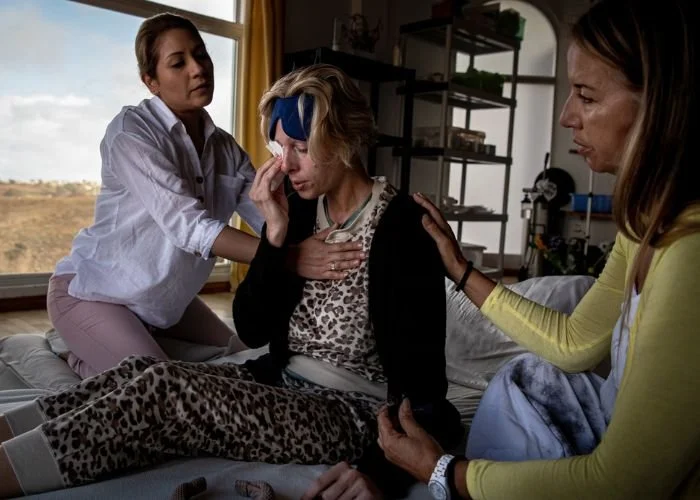Welcome! This blog offers practical resources for understanding and healing burnout, guilt, betrayal and anxiety.
You'll find expert, easy-to-use tools informed by EMDR, Somatics, Brainspotting, and IFS to heal the root of chronic overwhelm and live with more ease and clarity.
Use the search bar below to find resources on specific topics:

Supporting a Loved One Through Pregnancy Loss: A Guide for Friends and Family
Watching someone you care about navigate pregnancy loss is heartbreaking. Words often feel inadequate, and actions clumsy. This guide helps friends and family understand complex grief and trauma, showing you how to truly be present. Because while you can't fix their loss, your support makes a real difference. Read on to learn how to help.

Be Kind to Your Grief: Quick Read
Feeling the deep ache of grief and wondering when it will end? It’s normal for us to do a lot to not feel the deep hurts in grief. This post offers a different perspective, rooted in Internal Family Systems (IFS). I’m inviting you to see grief not as an enemy, but as a part of yourself that deserves kindness and understanding. If you’re curious, read more here.

The “Political” Grief of Living in 2025 As a Person Who Cares About Others
Living in 2025 can feel disgusting, confusing, and “OK,” causing deep existential grief for those who care about others. This distress manifests as a profound sense of loss and moral injury for helpers. For those of us who care and who want to fight, this collective pain requires acknowledgment and action. I commit to lifelong learning, amplifying voices, and tangible support for a more just world. You can, too!

A Compassionate Guide: Helping Your Friend Through Betrayal Trauma & Infidelity
When a friend confides that they've been betrayed by infidelity, it's a moment that stops time. You see the raw pain, the confusion, and the sheer disbelief in their eyes, and you desperately want to make it all disappear. This guide offers compassionate advice on how to support your friend through the devastation of betrayal trauma, validating their feelings and offering practical ways to be a steady presence for someone you love.

Understanding Loss & Healing: The Many Faces of Grief
Maybe you've heard that grief follows certain steps, but your own experience feels different. You’re distant, angry and hurting, but are you “grieving”? Let’s learn about the multifaceted nature of grief. We'll explore the many ways loss can impact us, extending beyond traditional bereavement to include the grief of lost connections, shattered trust, and anticipated loss. This blog post explores grief, loss, and healing for busy adults.

Healing in the Mountains: Nature's Cure for Grief & Loss in Steamboat Springs, CO
Grief, in its many forms, can feel overwhelming. Here in Steamboat Springs, Colorado, the mountains and rivers offer more than just a backdrop - they provide a tangible pathway to healing after and during loss. We combine nature's calming power with EMDR, IFS, and somatic therapy for deep emotional release. Read this post to discover how intensive in-person therapy can help you find solace and renewal.

Beyond the Physical: Emotional Healing After Injury or Surgery with EMDR
Experiencing a physical injury can be a life-altering event, affecting not only your body but also your mind. Beyond the physical pain, many individuals grapple with a range of emotions, including grief, anxiety, and depression. This blog post explores the emotional toll of injury, the benefits of EMDR therapy, and strategies for reclaiming your life after trauma from a therapist who has been there.

Psilocybin-Assisted Therapy for Grief & Trauma: Honoring the Mazatec
Psilocybin-assisted therapy offers a beautiful path for those grappling with grief and trauma. Psilocybin has long been used by the Mazatec for sacred healing rituals. Working with psilocybin therapeutically can help us connect to deep-seated emotions and foster healing. In this post, I explore the science, cultural context, and therapeutic process, emphasizing a compassionate and respectful approach. Read on to learn more.

How to Help a Grieving Loved One & What NOT to Say: Quick Read
Grief is a powerful experience of intense sadness, anger, hurt, and loss. It’s a human experience that no one is really prepared for. This quick read, written by a grief therapist, equips you with the knowledge and empathy to support your loved ones. Learn powerful do’s and don'ts for communication, practical ways to show you care, and how to help grieving children navigate their emotions.

Lost A Beloved Pet?: EMDR Therapy Can Help
Losing a pet can feel like losing a family member. Grief, sadness, and suffering might follow the loss of a pet. If the loss was traumatic, you might be suffering from intense stress and guilt. EMDR therapy can help you process the complex emotions of grief, guilt, anger, and confusion, allowing you to heal and move forward with cherished memories. Learn from a grief therapist who has lost pets.

Finding Support After Suicide: Traumatic Grief and Ideas to Help
After losing someone to suicide, navigating the waves of grief can feel overwhelming. From shock and anger to guilt and sadness, the rollercoaster of emotions may seem never-ending. It's important to remember that healing is possible. By building a strong support network, understanding the complexities of suicide, and finding meaningful ways to honor your loved one, you can begin to find healing in the midst of your pain.

Lost? Disrupted? Struggling?: Understanding Grief and How to Get Help
Grief hits hard. It disrupts the brain's emotional control center, scrambling the circuits for happiness and connection. This throws a wave of raw emotions – sadness, anger, emptiness – at you after any loss. Even the dread you feel when you know a loss is coming, like caring for a terminally ill loved one, can trigger this emotional storm. And for some, the intensity lingers. Read on for the science behind grief and tools and resources to help you cope.

Let’s Work Together
-

Therapy Tools & Workbooks
Self-guided EMDR tools, Brainspotting exercises, and therapist-created workbooks designed to support healing on your own schedule.
-

For Therapists
For associate therapists in CA, CO, FL, or VA. Thoughtful supervision and private practice support grounded in The Calm Practice™ framework.
-

Online Therapy
Virtual EMDR and trauma therapy to help you process grief, guilt, and self-doubt from the safety of your own space.
-

EMDR Therapy
Structured EMDR therapy to process traumatic memories and reduce overwhelm so you can feel steadier in daily life.

